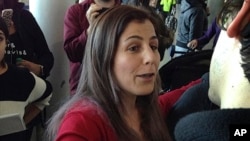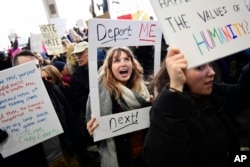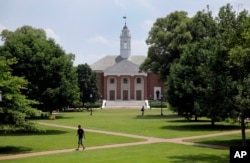Top officials at U.S. universities are pushing back against President Donald Trump’s executive order that temporarily limits the entry into the country of travelers from seven Muslim-majority nations.
Since Friday's order, the presidents of several universities have criticized the decision to halt immigration from Iran, Iraq, Libya, Somalia, Sudan, Syria and Yemen. Saudi Arabia, which is not on the ban list, ranks No. 4 among countries that send students to the United States, with 61,000 students here.
Many said the order is disrupting research and academics. Some suggested they would defy the ban if legally possible, the Associated Press reported.
The Association of American Universities (AAU), which represents 62 schools, urged Trump to reverse the order. It said the order will send top scholars to countries that compete with the United States academically, like Canada, Australia and Germany.
Critics of those who are protesting the travel ban point to Muslim-majority countries like Indonesia, Pakistan and Nigeria, which are not on the list. President Trump’s order refers to the prevention of terrorism by implementing “extreme vetting” of immigrants from the seven countries banned.
Other critics say the ban will negatively impact the U.S. economy. International students bring $32.8 billion to the U.S. economy, according to economic data compiled by NAFSA: Association of International Educators.
“It is vital to our economy and the national interest that we continue to attract the best students, scientists, engineers and scholars,” the AAU said in a statement. “That is why we have worked closely with previous administrations, especially in the wake of 9/11, to ensure our visa system prevents entry by those who wish to harm us, while maintaining the inflow of talent that has contributed so much to our nation.”
More than 1 million international students are in the U.S. More than 17,000 of them are from the seven affected countries, according to data from the State Department and the nonprofit Institute of International Education (IIE). More than 12,000 of those were from Iran.
In Boston and the vicinity, home to numerous universities that include Harvard, Massachusetts Institute of Technology (MIT) and Northeastern University, academics are vocal about foreign educators and students being blocked from entry.
Two professors of Iranian nationality fom the University of Massachusetts Dartmouth (UMass) were detained at Boston’s Logan International Airport as they tried to re-enter Jan. 27 under the ban.
Federal judges in New York, Massachusetts, Virginia and Washington state have issued a temporary stay to the travel ban at the request of the American Civil Liberties Union (ACLU). Some students and scholars from the countries in question, however, remain in legal limbo, stranded while traveling abroad or visiting home during the recent holiday break.
"This is not the country we promised to them when we invited them to study, teach and conduct research here," wrote UMass President Marty Meehan.
In Oregon, Portland State University’s President Wim Wiewel said the ban has a chilling effect on Muslim and other international students.
“We are dismayed,” Wiewel wrote, saying Portland State educates more than 1,900 international students, including 76 from Iran, Iraq, Libya, Yemen and Syria who are part of the ban.
“Young people from across the world have come to universities in the United States for decades because our higher education system is a global leader in providing educational opportunities,” he wrote. “At PSU, our international students provide cultural and academic contributions that are integral to our mission and enrich the campus life of Oregon and domestic students.
“As I said in declaring PSU a sanctuary campus, we have a responsibility to do all we can to make all of our students feel safe and supported regardless of their religion, national origin or immigration status.”
Indiana University has advised its international students from the banned countries not to leave the United States. It has designated a special page to update them.
“The U.S. president signed an executive order on January 27 that will impact visa processing abroad for international students and scholars,” the web page says. “We'll keep this page updated with the most recent information and our guidance.”
In another section, the school states, “Indiana University has long recognized the absolute necessity of a diverse and inclusive community to an excellent education. All IU students, regardless of their background or country of origin, are welcome in our community.”
The University of Michigan published similar statements.
“The university complies with federal requirements associated with managing its international programs. Otherwise, the university does not share sensitive information like immigration status,” it said.
“Campus police will not partner with federal, state or other local law enforcement agencies to enforce federal immigration law except when required to do so by law.”
Other dissenting schools include Princeton, Stanford and Columbia Universities, along with New York University.
“It is clearly up to the federal government to decide how to safeguard our nation, but at the same time, it is in America’s interest to remain the destination of choice for the world’s students and scholars,” Terry W. Hartle, senior vice president of the American Council on Education, told The New York Times.
Engineering, business and management, and unspecified are the preferred study fields of choice by international students, NAFSA says.
The Johns Hopkins University announced recently that it will offer Syrian refugees two full scholarships to its Master of Public Health program, according to MedPage Today. The application deadline for the 12-month program, however, is January 31.
Brown University is the only other school offering a scholarship program to Syrian refugees, MedPage Today reported.
In December 2016, a report lamented the lack of critical-language speakers among students in U.S. universities. Those foreign languages are defined as critical to U.S. diplomacy and national security.
More employers seek workers with varied language skills in markets of trading partners and in geopolitical regions in which diplomacy is critical, the report said.
The study of languages considered of “significant strategic interest to the United States,” include Hindi, Indonesian and Swahili, and “reflect a desire for stronger ties with important emerging regions around the world,” the reports states.
MIT professor Hazhir Rahmandad set up a public document on Google for international travelers to indicate whether they entered the U.S. or were detained. Rahmandad, who was born in Iran, is an assistant professor of system dynamics at the MIT Sloan School of Management.
The injunctions issued in Massachusetts, New York and Virginia last seven days, The Boston Globe reported. Rahmandad said on his Facebook page that the temporary stay is a narrow window for immigrants to return to the U.S.






